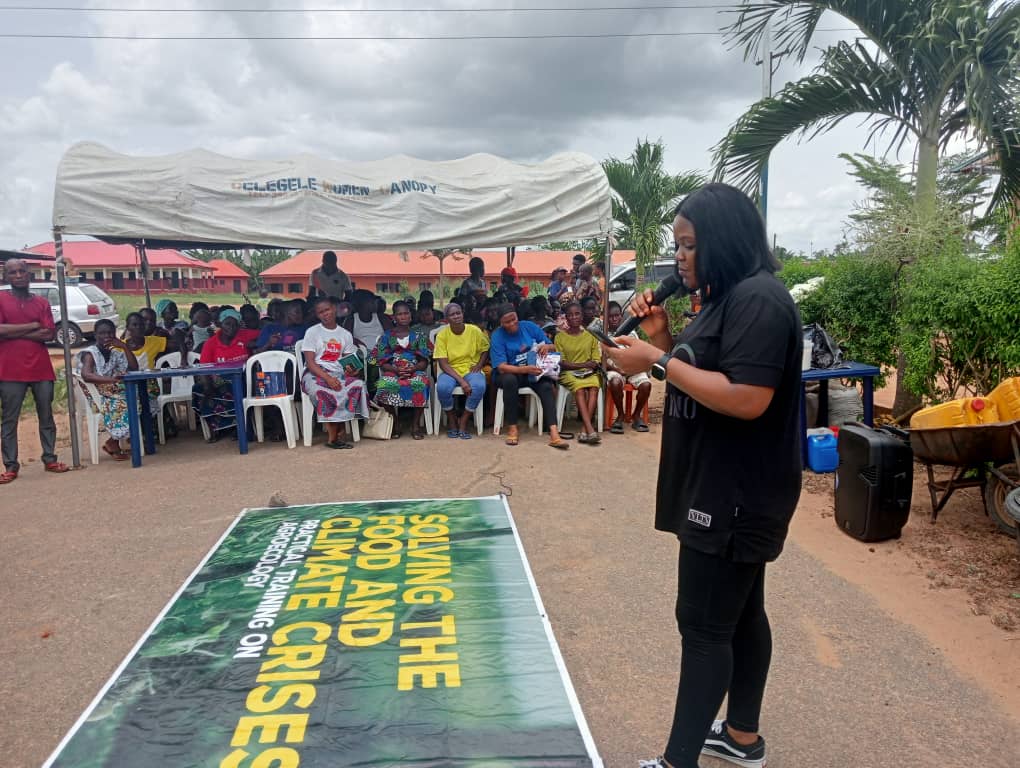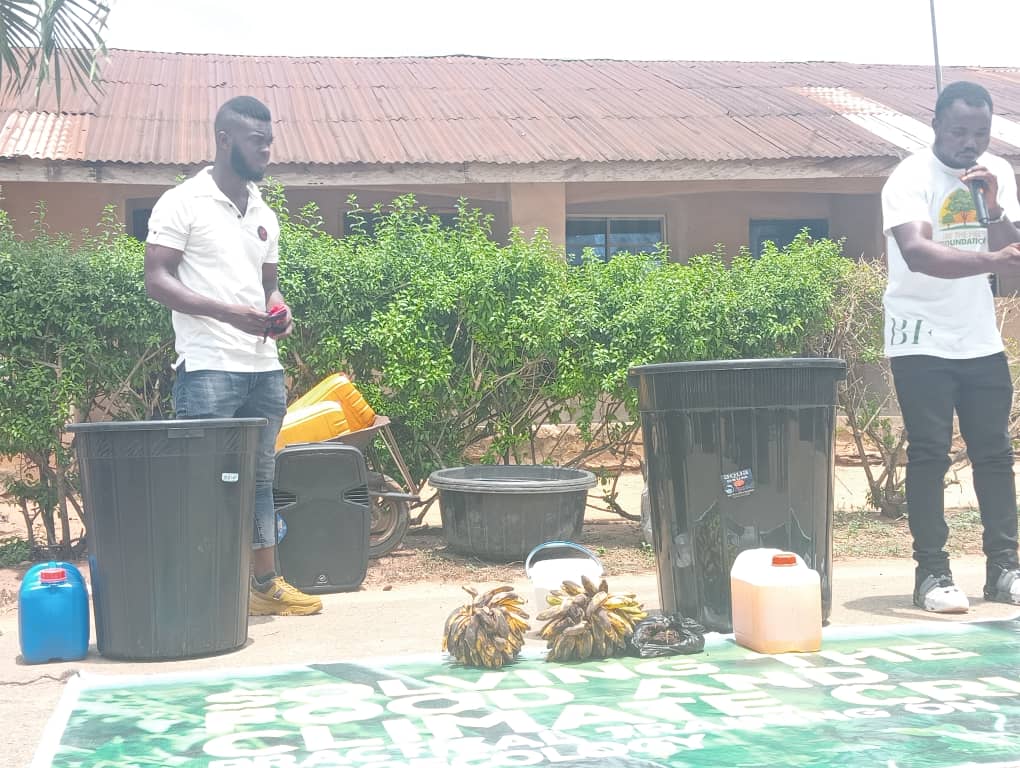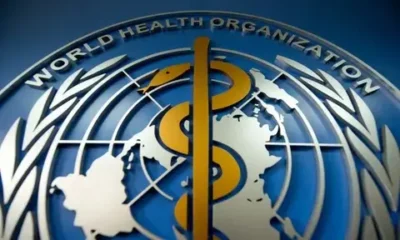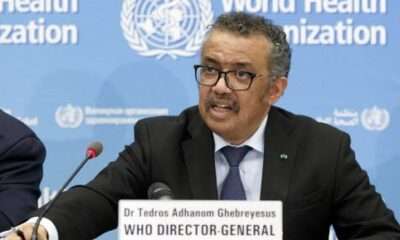News
WHO Raises The Alarm On Looming Diseases, Disasters
Published
3 weeks agoon
By
Editor
The World Health Organisation has warned that diseases and disasters loom large as causes of death and disability.
The organisation said this in its message on Sunday to commemorate the 2024 World Health Day.
The WHD is a global health awareness day celebrated every year on April 7 to provide an opportunity to focus world attention on a health problem or issue that deserves special attention.
The theme for the 2024 WHD is ‘My health, my right’. It was chosen to champion the right of everyone, everywhere to have access to quality health services, education, and information, as well as safe drinking water, clean air, good nutrition, quality housing, decent working and environmental conditions, and freedom from discrimination.
“Around the world, the right to health of millions is increasingly coming under threat.
“Diseases and disasters loom large as causes of death and disability. Conflicts are devastating lives, causing death, pain, hunger, and psychological distress.
READ ALSO: WHO Releases 5 Themes For Improved Mental Health
“The burning of fossil fuels is simultaneously driving the climate crisis and taking away our right to breathe clean air, with indoor and outdoor air pollution claiming a life every five seconds,” the global health body noted.
It said its council on the Economics of Health For All has found that at least 140 countries recognise health as a human right in their constitution. Yet countries are not passing and putting into practice laws to ensure their populations are entitled to access health services.
“This underpins the fact that at least 4.5 billion people — more than half of the world’s population — were not fully covered by essential health services in 2021.
“To address these types of challenges, the theme for World Health Day 2024 is ‘My health, my right’,” it said.
It urged the public to know their health rights.
“You have the right to safe and quality care, without any discrimination, privacy and confidentiality of your health information, information about your treatment and to informed consent.
bodily autonomy and integrity.
“Everyone should have access to the health services they need when and where they need them, without facing financial hardship. So, if you cannot access healthcare, that’s not right,” it added.
READ ALSO: 135 Million Africans Have Hearing Problems, Says WHO
The organisation also tasked the government to tax tobacco, sugar, and alcohol; eliminate trans fats; reduce amount of antimicrobials in the agri-food system by 30-50 per cent by 2030; stop fossil fuel subsidies and subsidise or exempt tax of clean energy and fuels such as solar-, hydro- and wind-based electricity; and prohibit all forms of discrimination.
It further urged the government to build up cycling infrastructure, support pedestrianisation; ensure decent work, worker rights and protections, and create fair, equal and gender-responsive working conditions for health and care workers; ensure access to social protection to reduce households’ vulnerability to poverty and counteract the negative impacts of unexpected life events on income, wealth or health.
“Invest in health like your bottom line depends on it – an additional $200–328 billion a year is needed globally to scale up primary health care in low- and middle-income countries (i.e. 3.3 per cent of national forecast GDP).
“Deliver on the right to health – make health services available, accessible, acceptable and of good quality for everyone, everywhere.Be strategic and build from the basics, reorient health systems around primary health care. Champion transparency and accountability, tackle corruption by strengthening governance and working across sectors.
“Involve the general public in health decision-making, ‘social participation’ happens when individuals and communities are meaningfully involved in decision-making around health, e.g., town-hall meetings and citizen assemblies, focus groups and consultations, health councils, representation on steering groups, and review boards.
“Know the health needs of populations and act on them, collect, analyse, use and monitor data, disaggregate by age, sex, economic status, education level, place of residence, race and ethnicity, and other characteristics and act to correct health inequities. Safeguard the right to health in war and conflict, protect health infrastructure and health workers, and ensure uninterrupted access to health services, in adherence to international humanitarian and human rights law,” WHO advised.
You may like


Nigeria Becomes First Country To Introduce New 5-in-1 Vaccine Against Meningitis – WHO


Prepare For Next Pandemic, UN Chief Tells World


Gaza Population In ‘Grave Peril’, Says WHO


Anthrax: 5 Things To Know About The Disease


Nigeria’s TB Case Finding Rises By 50%, Says WHO


135 Million Africans Have Hearing Problems, Says WHO
News
GMOs: HOMEF Trains Gelegele Farmers, Urges Them To Embrace Agroecology
Published
2 hours agoon
April 30, 2024By
Editor
Health of Mother Earth Foundation (HOMEF) has advised farmers in Gelegele and Nigeria at large to embrace agroecology in their farming activities, saying it is the viable solution to Nigeria’s food crisis.
This is just as the ecological think thank and advocacy organisation urged government at levels to support farmers to embrace agroecology rather than GMOs – Genetically Modified Organisms.
INFO DAILY reports that agroecology is a system of farming that focuses on restoring soil health, improving nutritional diversity and ensuring food sovereignty, while GMO are plants, animals or microorganisms that have had their gentic material manipulated either by introducing genes from a related or unrelated species or by editing the organism within itself.
Speaking at a one-training on agroecology for farmers at Gelegele community in Ovia North East Local Government Area of Edo State, Programmes Director, HOMEF, Joyce Brown, emphasised the need for the farmers to embrace agroecology, saying the use of GMOs poses threat to the environment and human health.
READ ALSO: HOMEF Trains Women On Climate Change Adaptation
She said: “The use of chemical pesticides poses risks to the environment, human health, and the economy. More than 50 per cent of registered pesticides in Nigeria are Highly Hazardous Pesticides (HHPS). Over 40% of the registered active pesticides in Nigeria are already banned in the EU and other countries of the World.

Practical session if the training at Gelegele community on April, 29,2024.
“Many of these HHPs registered and used in Nigeria have been proven to be linked to chronic health diseases such as cancer, kidney diseases, reproductive complications, endocrine disruption – hormonal challenges, skin diseases, organ failures, etc., as well as biodiversity and environmental destruction.”
According to her, most farmers, consumers, extension workers are not aware of the various hazards associated with the pesticide-active ingredients in the products they use, adding that this is the more reason HOMEF decided to take the responsibility of training and enlightening farmers.
Mrs Brown, while noting that agroecology will help Nigeria achieve food sovereignty if embraced, added: “Food sovereignty refers to a situation where all people at all times have access to healthy and nutritious food. Food sovereignty ensures that beyond food security – food is safe, food producers have the right to what they produce and how.”
READ ALSO: NABDA, NACGRAB Merger Dangerous For Nigeria’s Biosafety, HOMEF Warns
On his part, one of the trainers of the farmers and farm manager, Be The Help Foundation, Abuja, Chukwu Agozirim, said agroecology is a modern system farming which, according to him, help to eradicate poverty by increase in food production and making the environment safe for humans
He said Gelegele was selected due to the fact that the soil is contaminated as an oil producing community, adding “so the main purpose is to train and enlighten them on how they can go about their normal food production in spite of the contamination of their soil.”
He added: “We are bringing farming back to the olden days how our great-grandfathers were farming.”
Responding on behalf of other farmers, Mr Emmanuel Obi, while describing the training as an eye opener, promised to adapt the new method of farming.
The programme climaxed with a practical session of the training where the farmers were showed how they can use locally sourced materials to grow their farm produce.
News
[JUST IN] Akpata: UNIBEN Suspends Students’ Union
Published
4 hours agoon
April 29, 2024By
Editor
By Joseph Ebi Kanjo
The management of the University of Benin, UNIBEN, has suspended Students’ Union of the institution.
INFO DAILY reports that the suspension of the Students’ Union may not be unconnected with the incident that happened at the University’s Senior
Staff Club on Friday 12h April, 2024.
In the said incident, students of the university led by the Students’ Union president were said to have invaded an interactive session by staff of the university with the Edo State governorship candidate of Labour Party, LP, Olumide Akpata and in the process demanded a halt of the event, claiming that they (Students’ Union) were not informed of the event.
READ ALSO: Students Attack LP Guber Candidate At UNIBEN, Akpata Fingers Govt Official
The students were said to have behaved unruly at the event and in the process rough handled many of the stuff including a member of the Academic Staff of the Universities (ASUU), who was reportedly beaten merciless and eventually landed in the hospital.
Following the incident, management of the university was said to have set a panel to investigate the incident with a view to unraveling the truth.
Consequently, in a statement signed by A.A. Bobola, Registrar of the university and made available to newsman in Benin on Monday April 29, 2024, said, “after due consideration of the Report by the Management, the Vice Chancellor has approved the suspension of the University’s Students Union.”
READ ALSO: UNIBEN ASUU Threatens To Boycott Resumption Date Over Violent Attack On Member
The statement partly reads: “The suspension which is indefinite, takes immediate effect, that is, from today, Monday 29h April, 2024.
“Accordingly, all Officers of the Students’ Union are to handover all properties of the Union in their possession to the Dean, Students’ Affairs not later 4.00pm on Tuesday 30 April, 2024.
“In the interim, a Caretaker Committee composed of representatives of Faculties, Schools and Institutes has been approved to coordinate students’ activities during the period of
suspension.
“The above directive of the Vice Chancellor is hereby communicated for the attention of
the University Community and compliance of the erstwhile Union Officers as appropriate.”
News
Ooni: Suspended Benin Palace Functionaries Banished
Published
5 hours agoon
April 29, 2024By
Editor
Six Oba of Benin palace functionaries have been ostracized.
The palace functionaries were said to have engaged themselves in a sacrilegious show of shame and falsehood against the Benin Custom and tradition.
The banished palace functionaries are Johnbull Igbinosun, Iduhonre (Ihogbe), S.E. Aigbiremwen, Efesoghoba (Ogbelaka) and two other Ogbelaka functionaries — Ogbeide Osagie and Osamudiame.
READ ALSO: Oba Of Benin Suspends Six Officials For Posing As Palace Emissaries To Ooni Of Ife
They had falsely claimed to be emissaries of the Omo N’ Oba N’ Edo Uku Akpolokpolo, His Royal Majesty, Ewuare Il, Oba of Benin in the palace of the Ooni of Ife, His Imperial Majesty, Oba Adeyeye Enitan Ogunwusi; (Ọjájá II), where they rendered a “disjointed account of the link between the Benin Royal Dynasty and the Ooni-ship of Ife at Ooni of Ife’s Palace in Osun State recently.”
A statement signed by Mr. Osaigbovo Iguobaro, Chief Press Secretary to the Oba of Benin on Monday April 29, 2024, said they admitted before a committee led by Chief Ekhoerovbiye Oviasogie, the Uwangue of Benin that they erred against Benin Customs.
READ ALSO: Tragedy In Ekiti As Man Stabs Wife To Death Over Infidelity
The Uwangue of Benin, who described their action as a deliberate attempt to rubbish Benin Kingdom, pronounced the suspension of the Palace functionaries.
Consequently, they were also stripped off of Benin Royal beads, recognition as palace functionaries and their traditional titles, which were handed over to the ancestors.
The suspended palace functionaries were also barred from parading themselves as Benin palace functionaries and stopped from participating in any traditional rites in Benin.
They were thereafter escorted out of the Palace by Chiefs, including Ewaise (traditional seers) with occipital horns invoked ancestral spirits to bear witness.

GMOs: HOMEF Trains Gelegele Farmers, Urges Them To Embrace Agroecology

[JUST IN] Akpata: UNIBEN Suspends Students’ Union

Ooni: Suspended Benin Palace Functionaries Banished
Trending

 News4 days ago
News4 days agoEdo: FRSC Threatens Sanction On Truck Drivers Loading Goods, Passengers Together

 Headline4 days ago
Headline4 days agoSaudi Arabia Opens First Alcohol Store, Nigerian Muslims React

 Headline4 days ago
Headline4 days agoVIDEO: Meet Nigerian Pastor Who Predicted World Will End April 25

 News4 days ago
News4 days ago243 Passengers Cheat Death As Air Peace Plane Makes Emergency Landing At Lagos Airport

 Metro5 days ago
Metro5 days agoJUST IN: Four-year-old Boy Dies In Abuja School, Parents Suspect Foul Play

 Metro5 days ago
Metro5 days agoJUST IN: Protesters Storm APC Secretariat, Demand Ganduje’s Resignation

 News3 days ago
News3 days agoDSTV Price Hike: Five Alternatives Nigerians Are Opting For

 Politics4 days ago
Politics4 days agoEdo Guber: PDP Unveils 200-member Campaign Council

 News5 days ago
News5 days agoEFCC Withdraws Appeal Against Former Kogi Gov, Bello

 News4 days ago
News4 days agoJUST IN: Senator Ayogu Eze Is Dead




































